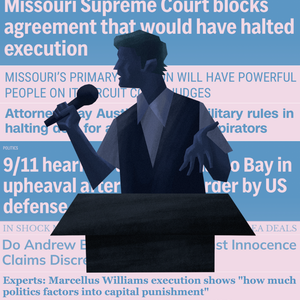A recent editorial in Florida’s Tampa Bay Times called for lawmakers to study the state’s death penalty because of its high number of exonerations and death sentences. Using information from DPIC’s recent 2012 Year End Report, the editorial noted that 2012 marked the second consecutive year in which the state led the country in new death sentences. The editorial suggested that one of the reasons for these numbers was likely Florida’s failure to require a unanimous jury recommendation for death sentences, one of the few states in the country with such a policy. While implying that the better path might be complete abolition of the death penalty, the editorial called for changes in the sentencing process, saying that its current procedures are haphazard and error-prone. The paper concluded, “Florida is long overdue for a comprehensive look at its death penalty system… It is time to better understand why the state imposes the penalty disproportionately and ends up exonerating so many. Basic justice demands it.” Read the full editorial below.
Florida’s death penalty needs fresh look
5 states have repealed the death penalty in the last 5 years, with Connecticut being the latest to do so in 2012. But as other states have become disenchanted with the ultimate punishment in light of so many wrongful convictions, Florida has moved in the opposite direction. Last year was the second straight that this state ranked 1st in the nation in new death sentences. There is no political will to follow the enlightened path of abolition, but Florida should analyze why it’s such an outlier. One likely reason is that the state doesn’t require a unanimous jury recommendation for a death sentence, and that should be corrected.
Florida sentenced 22 people to death last year. Compare that to the more populous states of California, which sentenced 14 inmates, and Texas, the state with the highest number of executions, which put only nine new inmates on death row last year, according to a report by the Death Penalty Information Center. The count raises Florida’s death row to 408 inmates. But even as the state adds to death row, it is finding problems with the legal process that led to those convictions and sentences. Florida also leads the nation in the number of inmates who have had their death sentences reversed. Out of 142 such cases, Florida accounts for 24 exonerations, acquittals or charges subsequently dropped, according to the center. Some of these were people shown to be innocent of the crime. Frank Lee Smith, for instance, was exonerated posthumously. The real perpetrator was identified after Smith died from cancer after he spent the last 14 years of his life on death row.
For years, Raoul Cantero has been urging the state Legislature to require a unanimous jury recommendation for death sentences. Cantero, a former Florida Supreme Court justice who was appointed by Gov. Jeb Bush, saw how haphazardly the death penalty is applied and how that can lead to potentially fatal errors. Florida is the only state that permits juries to recommend a death sentence, and identify the aggravating circumstances that justify it, by a simple majority vote. Were jurors required to all agree, as they are required to do for the initial conviction, the close cases that don’t truly meet the test of heinousness wouldn’t clog up the courts.
Lawmakers who have opposed this change have made the argument that it might have led to serial killers such as Ted Bundy escaping the death penalty, since Bundy’s jury voted 10 – 2 for death. But when a jury that knows its judgment has to be unanimous, it changes the dynamic of the deliberations and the likely outcome.
The state’s leaders have been deaf to the inherent sense in adopting the tighter rules of other death penalty states. During the last legislative session, a bill that would have required capital-juror unanimity during the trial’s sentencing phase was not heard. But if state lawmakers aren’t willing to do what is right, the courts may force the issue. Both state and federal courts have indicated constitutional concerns over Florida’s system.
Florida is long overdue for a comprehensive look at its death penalty system — an endeavor that any branch of government could launch. It is time to better understand why the state imposes the penalty disproportionately and ends up exonerating so many. Basic justice demands it.
(“Florida’s death penalty needs a fresh look,” editorial, Tampa Bay Times, January 6, 2013.) See Editorials and Arbitrariness.
Arbitrariness
Oct 04, 2024

A Chance at Life, Withdrawn: When Politics Interferes with Plea Deals
Arbitrariness
Aug 06, 2024

